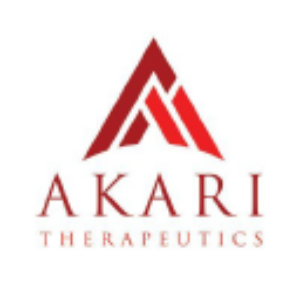Akari Therapeutics Continues Key Research on its Novel Antibody Drug Conjugate Payload PH1 to Further Demonstrate its Unique Ability to Target Cancers Fueled by Oncogenic Drivers
Rhea-AI Summary
Akari Therapeutics (NASDAQ:AKTX) is advancing research on its novel antibody drug conjugate (ADC) payload PH1, a spliceosome modulator designed for cancer treatment. The company highlighted that PH1 demonstrates multiple mechanisms of action, including cancer cell death induction and immune system activation against tumors.
Key features of PH1 include its ability to target cancers driven by oncogenic factors like KRAS, BRAF, and FGFR3, reduced off-target toxicity through engineered linker technology, and resistance to standard efflux transporters. The company expects to release new preclinical data on PH1's impact against a key oncogenic driver before the end of 2025.
Positive
- Novel PH1 payload demonstrates dual action: killing cancer cells and activating immune system
- Engineered linker technology reduces off-target toxicity by releasing payload only within cancer cells
- PH1 shows resistance to standard efflux transporters that typically cause drug resistance
- Demonstrated effectiveness against major oncogenic drivers (KRAS, BRAF, FGFR3)
Negative
- Still in preclinical stage with no human trial data available
- Additional research data pending, creating uncertainty about full therapeutic potential
News Market Reaction – AKTX
On the day this news was published, AKTX gained 0.51%, reflecting a mild positive market reaction.
Data tracked by StockTitan Argus on the day of publication.
PH1 modulates RNA splicing, causing cancer cell death while activating the immune system to attack cancer throughout the body
Company advancing pipeline of ADCs using PH1 payload across both Trop2 and an undisclosed target
Emerging new preclinical data on impact of PH1 payload against a key oncogenic driver is expected before year-end
BOSTON and LONDON, July 23, 2025 (GLOBE NEWSWIRE) -- Akari Therapeutics, Plc (Nasdaq: AKTX), an oncology biotechnology company developing novel immuno-oncology payload antibody drug conjugates (ADCs) for the treatment of cancer, today reiterated its commitment to ongoing research to better understand the multiple effects of its novel spliceosome modulator, PH1, having demonstrated it may also act to inhibit key drivers in cancer tumors.
“We are excited to build on the scientific data already established for our novel PH1 spliceosome modulator payload with continued, ongoing research,” commented Abizer Gaslightwala, President and CEO of Akari Therapeutics. “In addition to the cytotoxic and immuno-oncology modes of action for this payload, we have also demonstrated its ability to induce cytotoxicity in cancer cells under the influence of key oncogenic drivers such as KRAS, BRAF, and FGFR3 (Patent WO2024220546A2). As such, we are continuing to further investigate how this novel payload may impact other key drivers relevant to cancer tumors, and we look forward to releasing this key data in the near future.”
Akari’s ADCs utilize its novel spliceosome modulator payload, PH1, and have the potential to significantly improve future oncology therapies based on current preclinical data demonstrating the following:
- Killing cancer cells while activating the immune system: In addition to killing cancer cells, spliceosome modulation by the PH1 payload causes the accumulation of mis-spliced proteins, generating neoantigens that activate the immune system to further attack the cancer tumor.
- Reducing off-target toxicity: Linker is engineered to only release PH1 payload intracellularly within targeted cancer cells to mitigate off-target toxicity.
- Circumventing traditional cancer resistance mechanisms: PH1 is resistant to standard efflux transporters that can cause cancer cells to become resistant to current payloads used on ADCs.
Akari continues to build on this key data for its spliceosome modulator payload with further research ongoing on how the payload can also disrupt key drivers responsible for cancer cell growth. Preliminary data from additional preclinical research experiments testing activity of PH1 against an established oncogenic driver unique to a major tumor are expected before year-end.
About Akari Therapeutics
Akari Therapeutics is an oncology biotechnology company developing novel payload antibody drug conjugates (ADCs). The Company has developed its first novel payload, PH1, a spliceosome modulator designed to disrupt RNA splicing within cells. PH1 is highly differentiated in its mechanism of action against cancer cells from current ADC payloads that use Topoisomerase1 inhibitors or tubulin inhibitors. This splicing modulator has been shown in preclinical animal models to induce cancer cell death while activating immune cells to drive robust and durable activity. Using this novel payload, Akari has the ability to generate multiple ADC molecules based on the desired application to a range of cancer targets of interest. Akari’s lead candidate, AKTX-101, targets the Trop2 receptor on cancer cells and delivers its novel PH1 payload directly into the tumor. In preclinical studies, AKTX-101 has shown to have significant activity and prolonged survival, relative to ADCs with traditional payloads. Additionally, AKTX-101 has the potential to be synergistic with checkpoint inhibitors and has demonstrated prolonged survival as both a single agent and in combination with checkpoint inhibitors, as compared to appropriate controls. The Company is generating validating data on its novel payload PH1 to continue advancing its lead asset, as well as other undisclosed targets with this novel payload.
For more information about the Company, please visit www.akaritx.com and connect on X and LinkedIn.
Cautionary Note Regarding Forward-Looking Statements
This press release includes express or implied forward-looking statements within the meaning of Section 27A of the Securities Act of 1933, as amended, and Section 21E of the Securities Exchange Act of 1934, as amended, about the Company that involve risks and uncertainties relating to future events and the future performance of the Company. Actual events or results may differ materially from these forward-looking statements. Words such as “will,” “could,” “would,” “should,” “expect,” “plan,” “anticipate,” “intend,” “believe,” “estimate,” “predict,” “project,” “potential,” “continue,” “future,” “opportunity” “will likely result,” “target,” variations of such words, and similar expressions or negatives of these words are intended to identify such forward-looking statements, although not all forward-looking statements contain these identifying words. Examples of such forward-looking statements include, but are not limited to, express or implied statements regarding the ability of the Company to advance its product candidates for the treatment of cancer and any other diseases, and ultimately bring therapies to patients; the Company’s targets, plans, objectives or goals for future operations, including those related to its product candidates. These statements are based on the Company’s current plans, estimates and projections. By their very nature, forward-looking statements involve inherent risks and uncertainties, both general and specific. A number of important factors, including those described in this communication, could cause actual results to differ materially from those contemplated in any forward-looking statements. Factors that may affect future results and may cause these forward-looking statements to be inaccurate include, without limitation: the potential impact of unforeseen liabilities, future capital expenditures, revenues, costs, expenses, earnings, synergies, economic performance, indebtedness, financial condition and losses on the future prospects, business and management strategies for the management, expansion and growth of the business; risks related to global as well as local political and economic conditions, including interest rate and currency exchange rate fluctuations; potential delays or failures related to research and/or development of the Company’s programs or product candidates; risks related to any loss of the Company’s patents or other intellectual property rights; any interruptions of the supply chain for raw materials or manufacturing for the Company’s product candidates, including as a result of potential tariffs; the nature, timing, cost and possible success and therapeutic applications of product candidates being developed by the Company and/or its collaborators or licensees; the extent to which the results from the research and development programs conducted by the Company, and/or its collaborators or licensees may be replicated in other studies and/or lead to advancement of product candidates to clinical trials, therapeutic applications, or regulatory approval; uncertainty of the utilization, market acceptance, and commercial success of the Company’s product candidates; risks related to competition for the Company’s product candidates; and the Company’s ability to successfully develop or commercialize its product candidates. While the foregoing list of factors presented here is considered representative, no list should be considered to be a complete statement of all potential risks and uncertainties. More detailed information about the Company and the risk factors that may affect the realization of forward-looking statements is set forth in the Company’s filings with the SEC, copies of which may be obtained from the SEC’s website at www.sec.gov. The Company assumes no, and hereby disclaims any, obligation to update the forward-looking statements contained in this press release except as required by law.
Investor Relations Contact
JTC Team, LLC
Jenene Thomas
908-824-0775
AKTX@jtcir.com







